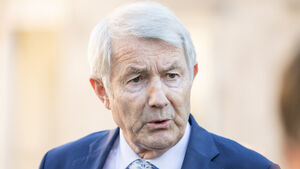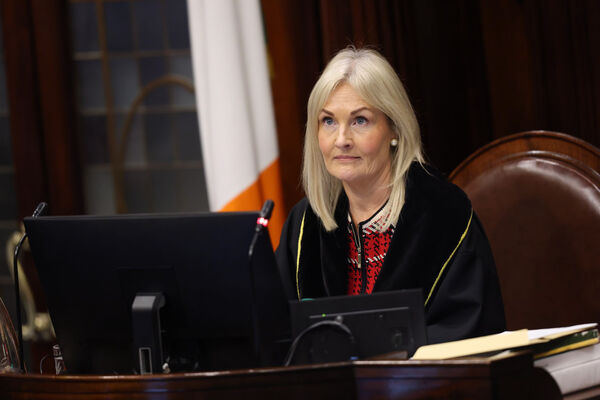Herald Opinion: Electorate deserves serious, meaningful debate

Michael Lowry TD during a media brieifng on Government formation at Leinster House, Dublin.
Last week, I found myself somewhat less tuned into the political scene than usual. However, I was still well aware of the chaos that erupted in the Dáil on Tuesday when the opposition descended into uproar, and Michael Lowry once again found himself at the centre of controversy.
To be clear, I am not a supporter of Michael Lowry. In fact, I fully agreed with the Taoiseach's 2011 statement that Lowry is unfit to serve in the Dáil. However, the people of Tipperary have consistently elected him, demonstrating their unwavering confidence in him—something I and many others do not share.
Watching the evening news on Tuesday, I was genuinely shocked by the behaviour I saw. While Lowry’s actions were far from commendable, they were certainly not the most shocking event of the day—yet they still dominated the headlines and Wednesday’s front pages. His supposed two-finger Harvey Smith salute to Paul Murphy was an inappropriate but unsurprising reaction to Murphy’s relentless goading. The rules of the Oireachtas explicitly prohibit the use of phones in the chamber, yet Murphy not only ignored this rule but used his device to record Lowry, seemingly with the intent of provoking a reaction. In this, he succeeded.
Even more concerning was the overall conduct of the opposition, who spent the session on their feet shouting and heckling the Ceann Comhairle, trying to ensure she could not be heard nor hear.
It was unsurprising to see Sinn Féin involved, given their history of political disruption—one need only recall Aengus Ó Snodaigh’s 2010 attempt to storm Government Buildings. Murphy and his left-wing colleagues have long employed such tactics. However, it was truly disappointing to see the Labour Party engaging in this behaviour.
I fully support political debate and disagreement—democracy, after all, is about the power of the people. The people have spoken, giving Fianna Fáil, Fine Gael, and a collection of independents the mandate to form a government. That government is now attempting to govern, yet Sinn Féin and their allies seem intent on blocking every effort. Their opposition to changes in standing orders is noted, but the government appears to have the votes to implement them. Rather than engaging constructively, the opposition has resorted to shouting down the Ceann Comhairle and obstructing the legislative process—a strategy that, if employed by Fine Gael or Fianna Fáil, would be immediately condemned.
The rules of parliament are simple: when the chair stands, you sit. Watching grown adults ignore the chair while shouting, roaring, and disrupting their workplace is shocking—especially in our national parliament. There is no doubt that changes are needed, but under the present circumstances, the opposition will likely resist any attempt. Perhaps the phone pouches that Minister Foley famously introduced for secondary schools should be implemented in Leinster House to prevent the use of phones in parliament. In addition, a class in decorum and manners should be attended by all members, and that word we try to teach children—"respect"—could become part of our parliamentarians' repertoire.

There will, of course, be a vote of confidence in the Ceann Comhairle today, and the result will reaffirm the Dáil’s confidence in her. After all, a majority of over 90 members will back her, while the opposition will oppose her. Hopefully the result will be accepted and some level of normality can return to the workings of the Dáil.
The influence held by Michael Lowry remains an uncomfortable reality for many, myself included. Additionally, the arrangement where independent TDs support the government while maintaining opposition status raises legitimate concerns. While administrative facilitation for all deputies is fair, enjoying opposition privileges while effectively backing the government is surely contradictory.
While I understand the opposition’s frustration, their current approach does nothing to further democratic discourse. It sets a poor example for the Irish public at a time when leadership and stability are sorely needed. With President Trump imposing tariffs and pushing to relocate key industries back to the US, Ireland’s corporate tax revenues face potential challenges. Job growth may stagnate, revenues could decline, and income tax receipts may fall. At the same time, prices of many goods are likely to rise, leading to inflationary pressure. Wednesday, 'Trump’s Liberation Day,' could mark the beginning of a difficult period for Ireland. Our focus should be on securing the country's economic future, not engaging in political theatrics.
The events of last Tuesday were an embarrassment to Irish democracy. The electorate deserves serious, meaningful debate from its representatives, not chaos and grandstanding. If politicians believe intimidation and disruption will inspire public confidence, they may be sorely mistaken when the next election comes—though that won’t be until sometime in 2029.





